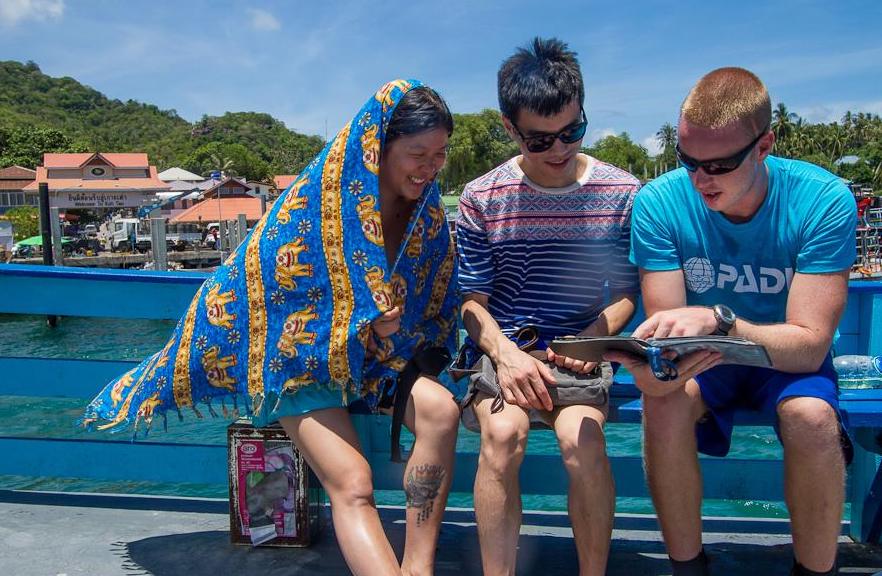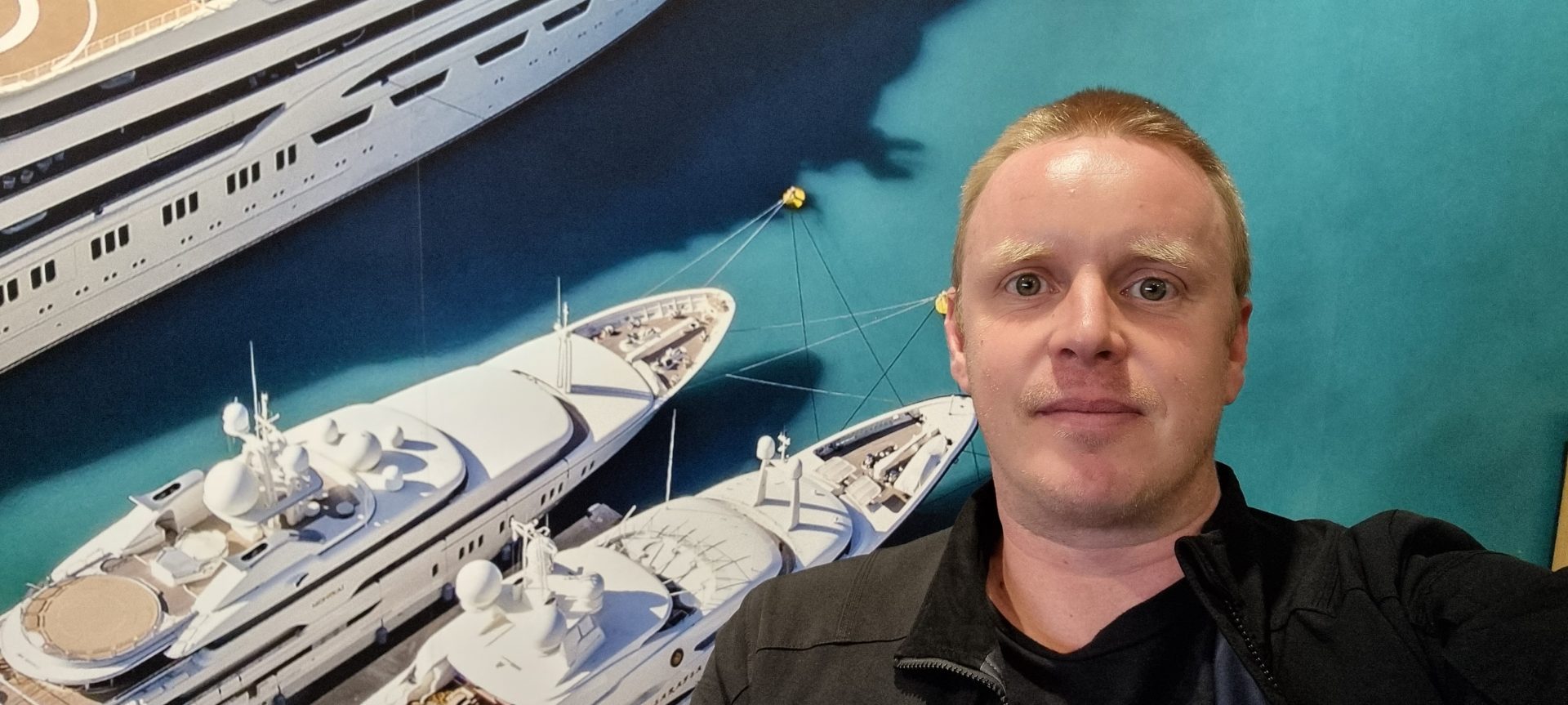Since leaving university in the UK, Mark Linne has lived quite the nomadic life, living and working in China and Thailand for 5 years as a multimedia producer and Scuba diving instructor before stepping into yachting and furthering his travels.

With his knowledge of the industry, Mark transitioned to a shoreside position and currently works for Global Services in Exeter. After over a decade of amazing experiences and memories in the industry, how did Mark find the process of re-settling and putting down roots in the UK again?
How long did you work as a yacht crew for? What was your role on board and which yachts did you work aboard?
Starting in 2016 I worked aboard a 97-metre private superyacht for around 4 years. I started as an Assistant Diver/Deckhand and shortly after took on the Lead Dive Instructor Role.
When did you leave the Superyacht industry, and when did you know it was the right time to leave?
I made the leap to return home to dry land and the UK at the end of 2019. For me, having lived nomadically for nearly a decade, my mid-thirties felt like the right time to return home, spend time with my family and friends and to put down roots in my home country.
Prior to leaving, did you plan an exit strategy? If so, what was it?
Prior to entering the industry, I had a keen interest in property development and was completing the conversion of a house into flats for rent. In my time aboard yachts, I was always seeking new ways to invest; from stocks, cryptocurrency, kick-starters, and property – with the ultimate aim of other income streams to live on. Over 10 years out of the country also meant I had little/no pension in place and so investments would also help ensure my retirement.
I planned to stay within the industry, possibly procurement or recruitment. I also considered commercial diving; however, this would most likely mean a return to the nomadic way of life. Alas – shortly after leaving I was faced with a hard Brexit and a Covid pandemic.
What was the most important lesson you learned as a Deckhand and Dive Assistant that you now apply to day-to-day life on land?
My time at sea presented some of the best times in my life, and in one instance the most difficult personal challenge I have ever faced with the death of a friend.
It’s easy to shut down and hide at times like this but I learned that accepting the facts, sharing, caring, supporting, and working with the close people around you, jumping back on the horse, and practicing mindfulness are key to overcoming deeper challenges such as this.
Day to day I try to be mindful and am grateful for all I have – even the little things.
What is your current job role and where are you based?
I am now working for Global Services as a Relationship Manager in Exeter.
Can you tell us more about your role at Global Services?
At Global, we source anything from a teaspoon to a main engine for Yachts, Commercial, and New Build vessels at all stages of their cycle. I work within the Yachting Team.
As a Relationship Manager, I am responsible for ensuring my portfolio of customers get what they want when they want. I actively liaise with customers, manufacturers, and vendors to make the whole process as quick, easy, and cheap as possible for my customers.
Did you have any other career options in the back of your mind when you were considering your life after yachting? What were they and why did you choose to work for Global Services?
Returning home during Brexit and Covid was less than ideal, with many companies cutting back on recruitment. My intended few months back at home with my Mum quickly became a year. However, having the Cornish coast close to us, beautiful weather, and making up for lost time with my Mum, I remained mostly sane.
Towards the end of Lockdown, I found a partner and we moved in together in Exeter. I also took a job working with boats in the local area, but the reassuring feeling of being settled unfortunately didn’t last as long as I would have liked. I then moved in with friends for 10 months and quit my job.
My focus returned when deciding to buy a place of my own in the centre of Exeter…just in time to beat the mortgage rate hikes. Then I was contacted by Global Services in Exeter whom I had been in touch with since my days aboard the yachts – they had an opening! An interview later I was offered a Relationship Manager position – I of course leapt at the chance!
I am now loving it and am excited to work with the ever-growing and dynamic team at Global Services. Now I feel that, after nearly 3 tumultuous years since leaving life at sea, I am finally on my way to truly settling
If you could go back to the start of your yachting career, would you change anything? i.e., financial choices, ways you would have enhanced your CV, extra training courses, and so on.
Possibly the only thing I would change is to explore the world of yachting earlier in life. I joined in my early 30s. Whilst this had its advantages, I feel that had I joined sooner I would have perhaps explored furthering my career and pursuing the Officer route. As it was, I had reached a point in my life of wanting to settle down and as such did not.
Read More: Life After Yachting With Sisterhood By Michelle

What does success mean to you and what is your career vision for the next 5 years?
Happiness. To be settled and happy in life is the simplest wish anyone could ask for. It’s not until the balance is upset that you realise how fundamentally important these simple things are – it’s not all about money or ‘fame’.
My job at Global Services has been a welcome breath of fresh air and has left me feeling reinvigorated. It is presenting some exciting and interesting new challenges for me, and I look forward to working with the team to grow the business further, reconnect with the industry and bring my past knowledge and skills into the fold to help drive my success here.
Lastly, can you share 3 pieces of advice for crew members thinking about their life after yachting?
1. Invest – Enjoy your time and make the most of the travel opportunities yachting presents – but don’t fritter away your money on too much excess. Save a decent chunk of your monthly salary and invest what you are comfortable with. I know many people who have been in the industry for years and have nothing saved. Research the numerous avenues available and seek financial advice – both from advisors and your peers.
2. Be prepared for a potential reverse lifestyle/culture shock. Depending on how long you have been away for it can feel odd to have such a rapid change of pace in life and to return to what may initially seem like unfamiliar territory, even though it’s home. Remember why you returned in the first place and stay focused on what you want to achieve. Things may not go as smoothly as you first planned but be pragmatic and resilient and keep pushing forward.
3. Sunscreen.












.gif)
.gif)





